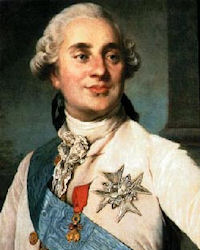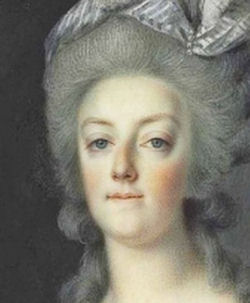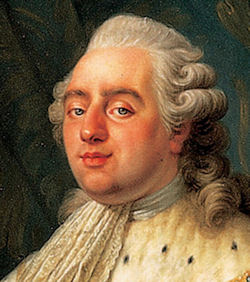Louis XVI
 Louis XVI, the grandson of Louis XV, was born at Versailles, August 23, 1754. He was the second son of Louis, Dauphin of France, and Marie Josephe of Saxony, and received at his birth the title of Duc de Berry. In 1770 he married Marie Antoinette, a daughter of Maria Theresa, Empress of Austria. If Louis XV. was the most contemptible of kings, his successor was among the weakest, and, in the crisis which confronted France, weakness in a good king was the greatest of crimes. Only the utmost strength and firmness of the king in the support for years of an unpopular policy could have secured the reformation of France without a revolution, and of this Louis XVI was incapable.
Louis XVI, the grandson of Louis XV, was born at Versailles, August 23, 1754. He was the second son of Louis, Dauphin of France, and Marie Josephe of Saxony, and received at his birth the title of Duc de Berry. In 1770 he married Marie Antoinette, a daughter of Maria Theresa, Empress of Austria. If Louis XV. was the most contemptible of kings, his successor was among the weakest, and, in the crisis which confronted France, weakness in a good king was the greatest of crimes. Only the utmost strength and firmness of the king in the support for years of an unpopular policy could have secured the reformation of France without a revolution, and of this Louis XVI was incapable.
As might be expected, the character of King Louis XVI has suffered more distortion at the hands of historians than has any other of the revolutionary figures; and this because he combined with that personal character of his a certain office to which were traditionally attached certain points of view and methods of action which the historian takes for granted when he deals with the character of the man. Historians tend to confuse the personality and character of Louis XVI with that of his office; they either by contrast exaggerate his unkingly defects or by sympathy exaggerate his kingly opposition to reform.
Louis was a man who had been casually introduced, almost without preparation, into the office which he held. He was very slow of thought, and very slow of decision. His physical movements were slow. The movement of his eyes was notably slow. He had a way of falling asleep under the effort of fatigue at the most incongruous moments. He was one of those men whom could never by any chance have been hoped to convince of anything. Louis possessed a number of intimate convictions upon which he was not to be shaken.
He was a resolute and capable rider of the horse: an aptitude in that exercise is impossible to the coward. Again, in those by-products of courage which are apparent, even where no physical danger threatens, he was conspicuous; he had no hesitation in facing a number of men, and he had aptitude in a mechanical trade a business by no means unconnected with virility.
Few men are possessed of the eye, the subtle sympathy, the very rapid power of decision, and the comprehension of human contrasts and differences which build up the apt leader of an armed force great or small. Most men are mediocre in the combination of these qualities. But Louis was quite exceptionally hopeless where they were concerned. He could never have seen the simplest position nor have appreciated the military aspects of any character or of any body of men. He could ride, but he could not ride at the head of a column.
Louis ascended the throne in 1774, and appointed Turgot minister of the finances, which were then in great disorder. Louis XVI succeeded to the crown, loaded by his grandfather's mismanagement with a thousand difficulties, with which his youth and inexperience ill fitted him to contend. Turgot, a man of probity and ability, undertook wise and extensive reforms; but these were resisted by the nobility and clergy. Necker having resigned in 1781, Calonne was appointed prime minister. He not only failed to supply the deficit in the revenue, but increased the public distress by his prodigality, and called an Assembly of Notables in 1787. In this year Calonne was superseded bj Lome'nie de Brienne, who also was found incompetent to guide the state through that great financial and political crisis, and advised the king to convoke the States-General, which had not been assembled since 1614.
 Marie Antoinette presents to history a character which it is of the highest interest to regard as a whole. It is the business of her biographers to consider that character as a whole; but in her connection with the Revolution there is but one aspect of it which is of importance, and that is the attitude which such a character was bound to take towards the French nation in the midst of which the queen found herself.
Marie Antoinette presents to history a character which it is of the highest interest to regard as a whole. It is the business of her biographers to consider that character as a whole; but in her connection with the Revolution there is but one aspect of it which is of importance, and that is the attitude which such a character was bound to take towards the French nation in the midst of which the queen found herself.
It is the solution of the whole problem which the queen's action apprehend the gulf that separated her not only from the French temperament, but from a comprehension of all French society. Had she been a woman lacking in energy or in'decision, this alien character in her would have been a small matter, and her ignorance of the French in every form of their activity, or rather her inability to comprehend them, would have been but a private failing productive only of certain local and immediate consequences, and not in any way determining the great lines of the revolutionary movement.
As it was, her energy was not only abundant but steadfast; it grew more secure in its action as it increased with her years, and the initiative which gave that energy its course never vacillated, but was always direct. She knew her own mind, and she attempted, often with a partial success, to realize her convictions. There was no character in touch with the Executive during the first years of the Revolution comparable to hers for fixity of purpose and definition of view.
It was she who chose, before the outbreak of the Revolution, the succession of those ministers both Liberal and Reactionary, whose unwise plans upon either side precipitated violence. It was she who called and then revoked, and later recalled to office the wealthy and overestimated Necker; she who substituted for him, and then so inopportunely threw over Calonne, the most national of the precursors of the Revolution, and ever after her most bitter enemy; it was she who advised the more particularly irritating details of resistance after the meeting of the first revolutionary Parliament; it was she who presided over (and helped to warp) the plans for the flight of the royal family; it was she who, after this flight had failed, framed a definite scheme for the coercion of the French people by the Governments of Europe; it was she who betrayed to foreign chanceries the French plan of campaign when war had become inevitable; finally, it was she who inspired the declaration of Brunswick which accompanied the invasion of French territory, and she was in particular the author of the famous threat therein contained to give over Paris to military execution, and to hold all the popular authorities responsible with their lives for the restoration of the pre-revolutionary state of affairs.
The vague histrionic content which permeates the poor at the sight of great equipages and rich accoutrements, the cheers of a crowd when such symbols accompanying monarchy are displayed in the streets all these were for Marie Antoinette the fundamental political feelings of mankind. An absence of them she regarded with bewilderment, an active opposition to them she hated as something at once incomprehensible and positively evil.
She had always believed, when she gazed upon a mass of the populace, that the difference between the crowd and herself was a moral reality. The contrast in external habits between the wealthy, the middle class, and the poor a contrast ultimately produced by differences in the opportunity and leisure which wealth affords she thought to be fundamental.
She was easily deceived by the flattery of place seekers. They haunted her presence, they depended upon her patronage, and, at the same time, they secretly ridiculed her. Her carriage, which was designed to impress onlookers and did have that effect upon most foreigners, seemed to most of the French observers (of a rank which permitted them to approach her familiarly) somewhat theatrical and sometimes actually absurd. The earnestness which she displayed in several lines of conduct, and notably in her determined animosity to certain characters (as that of La Fayette, for instance), was of an open and violent sort which seemed to them merely brutal and unintelligent; her luxury, moreover, was noticed by the refined world of Versailles to be hardly ever of her own choosing, but nearly always practised in imitation of others.
She was not a very frivolous, still less a dissipated, woman. She was wofully loose in tongue, but she was certainly virtuous. She gambled, but as the times went, and the supposed unlimited fortune of the Crown, her gambling was not often excessive; her expenditure upon jewelry and dress would be thought most moderate to-day in the case of any lady of wealthier families.
 Louis convoked the States-General at Versailles in May, 1789. This event was the signal for the explosion of passions, ambitions, and resentments which had accumulated and fermented during a long period of misrule. The Third Estate took the name of the National Constituent Assembly, and in July, 1789 the populace of Paris destroyed the Bastille. Thenceforth the progress of revolution was rapid and irresistible. The Assembly made a great and sudden change in the political and social condition of France by the abolition of tithes, titles of nobility, feudal privileges, and inveterate abuses. The landed estates of the Church, comprising nearly one-third of France, were confiscated.
Louis convoked the States-General at Versailles in May, 1789. This event was the signal for the explosion of passions, ambitions, and resentments which had accumulated and fermented during a long period of misrule. The Third Estate took the name of the National Constituent Assembly, and in July, 1789 the populace of Paris destroyed the Bastille. Thenceforth the progress of revolution was rapid and irresistible. The Assembly made a great and sudden change in the political and social condition of France by the abolition of tithes, titles of nobility, feudal privileges, and inveterate abuses. The landed estates of the Church, comprising nearly one-third of France, were confiscated.
The king, who was disposed to make large concessions and lacked firmness to resist popular aggressions, remained as a hostage of the old regime in the hands of the nation. Those who propose in the early part of the Revolution to check the mob in Paris, are excellent commanders: but Louis does not know it. Those who succeed each other at the Ministry of War, or at the head of the armies during the active part of the revolution are various in the extreme: but they all seem one to him. Between a fop like Narbonne and a subtle, trained cavalry man like Dumouriez, Louis made no distinction. The military qualities of La Fayette (which were not to be despised) meant no more to him than does music, good or bad, to a deaf man. From the beginning to the end of the movement, the whole of the military problem escaped him.
The position of Louis became so irksome and perilous that he attempted, in June, 1791, to escape with his family from Paris, but was arrested at Varennes and compelled to return. In March, 1792, a Girondist ministry was formed, and war was declared against Austria and Prussia. By the insurrection of August 10, the Jacobins, led by Danton and Robespierre, effected the total subversion of the monarchy and initiated the reign of terror. Louis was not weak, he was not impulsive, he was not even foolish: he was only wretchedly alone in his incapacities. Certainly such a nature could trust and rely upon no one who was not of this intimate kind, and he possessed no such intimate.
Louis was subjected to indignities and outrages from the mob, then tried for treason by the National Convention in September 1792, and condemned to death. He was executed January 21, 1793, and died with tranquil fortitude. The natural freedom of the people and the love of liberty inherent in them bore its fruits in the French Revolution, by which the ancien regime of that country was destroyed.
|
NEWSLETTER
|
| Join the GlobalSecurity.org mailing list |
|
|
|


